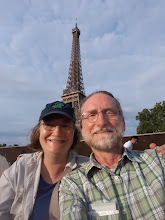Peeling an Onion, Part V
Once Jonathan and I decided to adopt from eastern Europe, the next step was choosing a country. Poland, Russia, and Ukraine all offered the possibility of sibling groups, which we desired.After some research, we quickly learned that Poland, a predominantly Roman Catholic country, gives strong preference to adoptive parents from that church body. As Lutherans, Jonathan and I decided that Poland would not be a good option for us.
The choice between Russia and Ukraine was much, much more difficult. These two countries presented us with very different pros and cons:
Adoption in Russia is similar to most countries in that social workers choose a match (called a referral) between parents and child based on documents submitted about each party. When the adoptive parents receive the referral in the mail, they choose to accept or reject it based on the information provided about the child. If they accept the referral, the parents travel to Russia to meet the child and decide for sure they want to adopt. After signing the appropriate documents, the parents return home and wait for several months while the paperwork churns through the Russian legal system. When it is ready, the parent(s) travel back to Russia to appear in court, finalize the adoption, and escort their child back to their home country.
In Ukraine, adoptive parents submit paperwork about themselves, and the Ukrainian national adoption bureau decides if the parents are acceptable to adopt a child. If the couple passes this stage, they receive an appointment date and time to appear at the national adoption office in Kyiv, the capital of Ukraine. In their appointment, notebooks of information are presented with a brief one-page description (in Ukrainian) of each child currently available for adoption. The parents are shown notebooks containing information on children who match their request; for us, we looked at documents in the room dedicated to sibling groups. No social workers are present in the entire process, since the Ukrainian authorities believe that the parent should make the choice. For the appointment, parents are permitted to bring a translator. In reality, these translators/facilitators do more than just translate, for they are aware of the legal and medical realities of different regions and even specific orphanages. According to the website of the Ukrainian adoption bureau, an apointment lasts about thirty minutes, at which point the parents must make their choice. (For us, the adoption workers were much more liberal with time, probably because of the complexity of our adoption.) Once a child is chosen (also called the "referral"), the parents travel to the region, meet the child, and decide in about a day if they want to adopt. After paperwork is submitted, one parent stays for several weeks while the paperwork makes its way through the court system. The extended stay allows for bonding with the child and more opportunity for the parent to learn about Ukraine's culture and the child's background.
Contemplating the choice between Russia and Ukraine, we were faced with difficult options. The adoption procedure in Russia would be less stressful, since we could contemplate the referral at home with plenty of time to reach a decision. Ukraine's method (parents themselves choosing the child to meet) was very scary for us, with the thirty-minute deadline feeling like an emotional pressure cooker certain to cause undue stress, as well as conflict between Jonathan and me. The option of later turning down a referral was not a valid backup plan for us; we knew that meeting a child and choosing not to adopt would be a terrible blow for the child, even if there were good reasons to decide against adoption. In addition, the Ukrainian adoption bureau frowns on too many rejected referrals. They are known in some cases to send the parents home without a child. My own adoption counselor did not feel I could handle the stress of the appointment and advised against Ukraine for that reason.
Cost-wise, the required travel (two trips) to Russia was prohibitive. Even with lodging and food costs in Ukraine for the extended stay, it was less expensive there than an extra international plane fare to Russia. And while we went to Ukraine with an agency, the Ukrainian government does not require it and even advises against it, and many adoptive parents save a lot of money by doing an "independent" adoption in Ukraine. Russian adoptions by definition require agency assistance, which is expensive.
The pros and cons of Russia and Ukraine seemed to balance out, at least in the area of procedure. Jonathan and I had already spent several months ferreting out the above information, and we realized that a different paradigm was necessary before we could make our decision.


0 Comments:
Post a Comment
<< Home